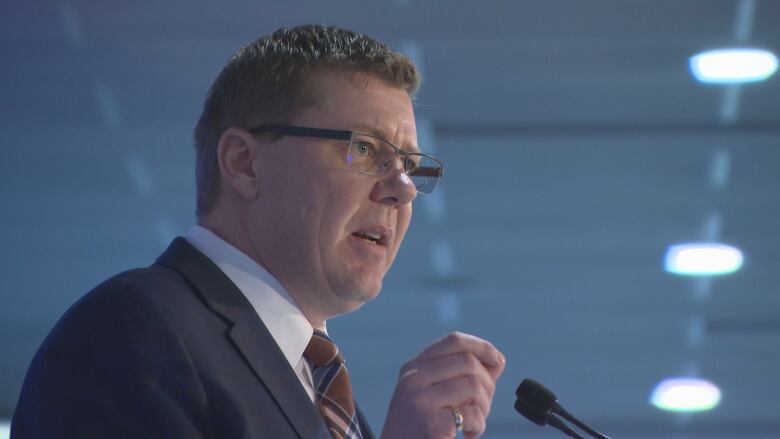Pot money won't be considered in upcoming provincial budget, Moe says
Local mayors, councillors press premier and cabinet ministers for plans on legal pot

Officials from Saskatchewan cities and towns have questions about the upcoming legalization of marijuana, but the provincial government is not yet providing many answers.
Officials from Regina,WarmanandWeyburn, Sask., put questions about legal marijuana to Premier Scott Moe and his cabinet during the "bear pit"session at the Saskatchewan Urban Municipalities Association conference in Regina on Wednesday.
Moe said he doesn't expect marijuana revenue or expenses to be worked into the upcoming budget, due to uncertainty as to what regulations will look like when it's legalized.
Saskatchewan has yet to lay out a comprehensive plan for how cannabis will be sold, how much it will cost, or what the legal age to purchase itwill be.That's even though some cities have already done some of their own planning.
Moe and Justice Minister Don Morgan told the SUMA conference that the province is waiting on more information from the federal government before releasing projections for how much legal pot will cost or how much money it could make.
"It's too soon to have that discussion," Morgan said in response to a question from Regina Mayor Michael Fougere on revenue sharing between the province and municipalities.
"It's a discussion for further on down the roadbut at this point in time, we're not looking at the bookkeeping or the cost issues," he said.
"We don't know what the demand is going to be, we don't know how many drug recognition experts we need, what kind of testing will be required in police vehicles and stations. We'll look at that further on down the road."
Costs, revenue expected to balance out
Other officials questioned whether the province had a plan for marijuana tourism, or how money generated from marijuana would flow to municipalities.
The answers were largely the same: it's too soon to say.
The federal, provincial and territorial governments reached an agreement in December that gives the provinces and territories 75 cents of every tax dollar collected. It's not clear how much money would then go to cities and towns.
"We're not sure what [revenues] will be in the short term. We're not sure what the expenses will be either," Moe said.
"For the coming year, we are not booking any revenues with respect to the sale of marijuana, but we're not booking any expenses either.
"We're hopeful it will be revenue neutral in the short term and as we move forward, I think we can have the discussion on how it rolls out," he said. "There's a lot of unknowns with respect to that."












_(720p).jpg)


 OFFICIAL HD MUSIC VIDEO.jpg)
.jpg)



























































































